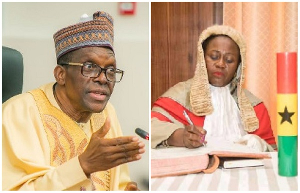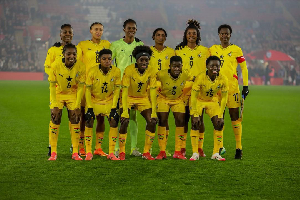The 1992 Constitution of Ghana, particularly the provisions of the constitution which touches on the separation of powers of the three arms of government, has really been undergoing a true test under the current dispensation.
On several occasions, the three arms of the government, namely; the executive, the judiciary and the legislature, have ‘knocked heads’ on issues of governance, with each arm flexing the powers vested in it by the constitution.
The ‘battle’ between the judiciary and legislature has been particularly interesting, with parliament often being at the receiving end.
The Speaker of Parliament, Alban Bagbin, has on a number of occasions expressed his frustrations with rulings of the Supreme Court of Ghana, which outlaws some of the decisions of parliament.
Reflecting on that particular aspect of this ‘battle,’ GhanaWeb takes a look at four (4) instances the Supreme Court declared decisions made by parliament unconstitutional.
1st and 2nd ladies are not eligible for ex-gratia, salaries of cabinet ministers – Supreme Court rules
The most recent ruling of the Supreme Court which outlawed a decision of parliament was the court's declaration that the spouses of the president of Ghana and his vice: the 1st and 2nd ladies, are not entitled to benefits of Article 71 officeholders, including ex-gratia benefits.
The ruling of the apex court of the land was on suits challenging parliament-approved recommendations by the Prof Yaa Ntiamoa-Baidu-led committee on emoluments for Article 71 officeholders, that spouses of President Nana Addo Dankwa Akufo-Addo and Vice President Dr. Mahamudu Bawumia should receive the same monthly salaries as cabinet ministers.
A seven-member panel of the Supreme Court, presided over by Chief Justice Gertrude Torkornoo, with Justice Gabriel Pwamang, Justice Lovelace Johnson, Justice Prof. Henrietta Mensa-Bonsu, Justice Barbara Ackah-Yensu, Justice Ernest Gawu, and Justice Samuel Asiedu as members, delivered the judgment in the two separate suits challenging the payment of salaries approved for first and second ladies.
The Member of Parliament for South Dayi, Rockson-Nelson Dafeamekpor; MP for Builsa South, Dr. Clement Apaak; and Nii Tackie Commey, a private citizen, in one of the cases, sued the Attorney General, asking it to reverse the payment of emoluments for 1st and 2nd ladies.
Also, in a separate action, the Bono Regional Chairman of the New Patriotic Party (NPP), Kwame Baffoe, popularly known as Abronye DC, filed a similar action against the state.
Supreme Court strikes out sections of Companies Act 2019:
The Supreme Court, on November 8, 2023, struck out section 13(2)(h) (i) and (ii)of the Companies Act 2019(Act 992) which it said was inconsistent with Article 19(2)(c) of the 1992 constitution.
According to dennislaw.com, this was the judgment in a constitutional matter filed by a lawyer, Derick Adu-Gyamfi, who prayed the apex court to inter alia delete, expunge or strike out subsections of the Companies Act, 2019 (Act 992).
The applicant said those subsections; 2(h)(I), 2(h)(ii), 2(a)(i), I(c), etc of Sections 13, 172, and 177 of the Act, are unconstitutional and violate the principle of fair hearing among others.
Supreme Court strikes out aspects of Standing Orders of Parliament:
The apex court of the land in March 2022 struck out aspects of the Standing Orders of Parliament, Order 109(3) which says a deputy speaker or any other member presiding shall not retain his original vote while presiding.
The court also ruled on this action, as it dismissed an application to pronounce as unconstitutional the passage of the 2022 budget statement because the 1st Deputy Speaker of Parliament, Joseph Osei Owusu, counted himself as part of the quorum needed to pass the budget while presiding.
The application was filed by private legal practitioner and law lecturer, Justice Abdulai, after the first deputy speaker's action helped the government to get the numbers to pass the 2022 budget.
He argued that in the context of Articles 102 and 104 of the 1992 Constitution, the Deputy Speaker was not permitted to count himself for the purposes of quorum, since he had neither an original nor a casting vote as Speaker presiding.
However, the 7-member panel of justices of the Supreme Court ruled that Osei Owusu, the Member of Parliament for Bekwai, exercised his right constitutionally as he is the representative of his constituent.
Supreme Court strikes out sections of ‘wee law’
In July 2020, the apex court in a 4-3 decision, held that Section 43 of the Narcotic Control Commission Act, 2020 (Act 1019) violated Article 106 of the 1992 Constitution, which details the processes a bill must go through before it is passed into law by parliament and was therefore null and void.
In other words, the court ruled that the section of the Narcotic Control Commission Act, 2020 which allows a licence to be granted to an entity to cultivate a small quantity of cannabis, popularly referred to as "wee", in Ghana for industrial and medicinal purposes is unconstitutional.
“The plaintiff's action succeeds. Accordingly, Section 43 of the Narcotics Control Commission Act, 2020 (Act 1019) is thereby declared null and void and struck out as unconstitutional as it contravenes the letter and spirit of the Constitution, 1992, particularly Article 106 (2) (a) (b), (5) and (6) thereof,” the court held.
The case, which culminated in the judgment, was filed by one Ezuame Mannan against the Attorney-General.
Justices on the majority side were Justices Jones Dotse, Clemence Jackson Honyenuga, Henrietta Mensa-Bonsu and Emmanuel Yonny Kulendi.
Justices Nene Amegatcher, Prof Nii Ashie Kotey and Issifu Omoro Tanko Amadu dissented.
The court explained in the explanatory memorandum attached to the bill placed before that the house did not set out in detail the policy change, the defects in the existing law, and the necessity to introduce a law to licence the cultivation of cannabis.
“The mode of introduction of Section 43 of Act 1019 violates the letter and spirit of the Constitution. Accordingly, Section 43 is hereby struck out as unconstitutional.
“The lack of debate on Section 43 of Act 1019 amounts to not only a direct violation of the letter of Article 106 of the Constitution, but also a violation of the spirit of the law.
“There was conspicuously, no debate over such a critical shift in policy by Parliament. Needless to say, this conduct and mode of law-making defeats the transparency and accountability enjoined by the Constitution,” graphic.com quoted the court as having said.
BAI/AE
Watch the latest episode of Everyday People on GhanaWeb TV below:
Ghana’s leading digital news platform, GhanaWeb, in conjunction with the Korle-Bu Teaching Hospital, is embarking on an aggressive campaign which is geared towards ensuring that parliament passes comprehensive legislation to guide organ harvesting, organ donation, and organ transplantation in the country.
General News of Thursday, 25 April 2024
Source: www.ghanaweb.com













